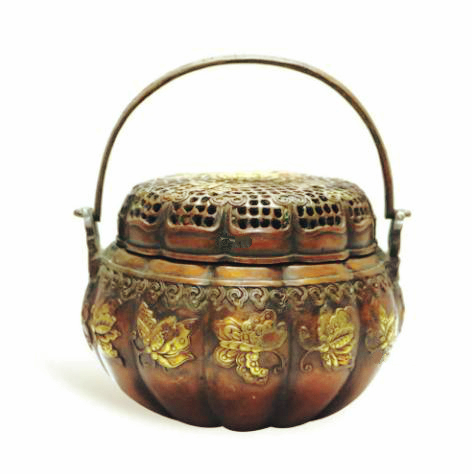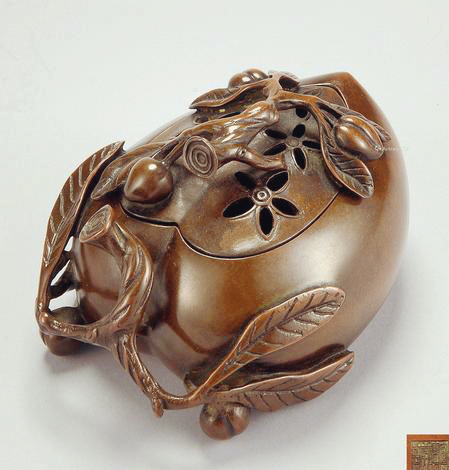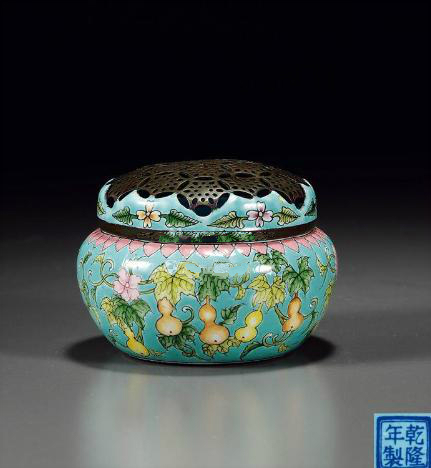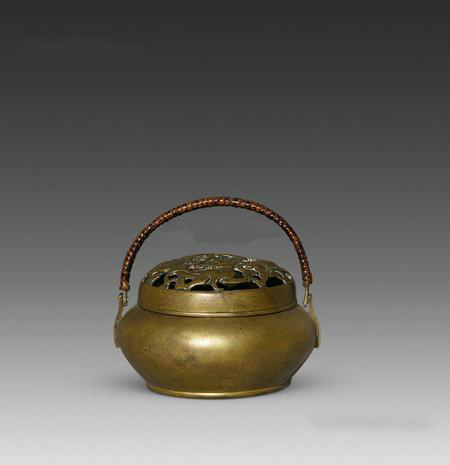古代御寒“神器"——燒炭的手爐為何不會燙手? How ancient Chinese people warmed their hands in winter
中國日報網(wǎng) 2023-12-20 16:57

在沒有暖氣、沒有電熱毯、沒有暖寶寶的時代,聰慧的古人發(fā)明了火墻、炭盆等取暖“神器”過冬御寒。此外,古人日常應(yīng)用較廣、較常見的還有一種叫做手爐(hand warmer)的取暖器物。

古代御寒“神器”手爐
手爐是古人常用的冬日取暖之物,多為銅制,也有銀、鐵、瓷制,里面放置火炭或尚有余熱的灶灰,可以捧在手上,小型的可籠進(jìn)袖內(nèi),所以又名“袖爐”。
Made of bronze or ceramics, ancient hand warmers had a variety of designs. Round, square and octagonal shapes are typical, with some fashioned to look like pumpkins, flowers and turtle shells.
古代的手爐多由青銅或陶瓷制成,設(shè)計(jì)多樣,主要樣式有方、圓和八角形,還有一些手爐形似南瓜、花朵和龜殼。

Inside a hand warmer, there were burning charcoal or simple coals. Some coals were blended with fragments and pressed into flower shapes, emitting a pleasant scent when burned.
手爐內(nèi)放置著燃燒著的木炭或煤塊。有些煤餅中混合了香料,壓制成花朵形狀,燃燒時散發(fā)出宜人的香氣。
手爐的前世今生
There is no accurate written record regarding the origin of this tool, but there are some tales about its invention.
關(guān)于手爐的起源沒有明確的書面記載,但民間流傳著一些故事。
One folk story concerns Emperor Yangdi from the Sui Dynasty who visited Jiangsu in the winter. Due to the bitter cold, the local official asked manufacturers to make a small warmer for the emperor that could be held in one's hands. Thus the hand warmer was created.
傳聞隋煬帝下江南時,由于冬季天氣嚴(yán)寒,當(dāng)?shù)毓賳T要求店家為隋煬帝制作一個可以拿在手里的小暖爐。于是手爐就此誕生。

By the Song Dynasty (960-1279), the tool was in widespread use. Techniques for producing the tool were extensively employed in the Ming and Qing dynasties (1368-1911).
到了宋代(960年-1279年),手爐取暖已經(jīng)流行開來。明清時期(1368-1911)手爐的制作技藝得到廣泛普及。
Many poems and books from this period recorded people using hand warmers.
這一時期的許多詩歌書籍都記載了人們使用手爐的場景。
The Dream of the Red Chamber, the classic novel by Cao Xueqin from the Qing Dynasty, also featured a maid sending a hand warmer to the protagonist Lin Daiyu in one chapter.
清代小說家曹雪芹的經(jīng)典著作《紅樓夢》其中一章描寫了侍女為林黛玉送手爐的情節(jié)。
如今,在眾多影視作品中,也時常閃現(xiàn)著手爐的身影。例如,《瑯琊榜》《甄嬛傳》里都有銅手爐出鏡。

燒炭的手爐為何不會燙
手爐通過燒炭取暖,可以說是一種小型移動式火盆,由爐身、爐底、爐蓋(爐罩)、提梁(提柄)組成。為什么里面燒著炭,手爐卻只是暖手而不燙手呢?

多數(shù)手爐的通高不過18厘米,長15厘米、寬10厘米左右,看著小小的,其實(shí)里面的結(jié)構(gòu)另有玄機(jī),分為外殼和內(nèi)膽兩層。在精美外殼內(nèi),還有銅制的內(nèi)膽。內(nèi)膽多架于外殼口沿之內(nèi),方便燃炭。上面的蓋子則是鏤空的,便于通風(fēng)換氣。通過內(nèi)外兩層的空氣傳導(dǎo),手爐
就暖而不燙了。
綜合來源:中國日報網(wǎng),重慶科技報
編輯:董靜

















 英語點(diǎn)津微信
英語點(diǎn)津微信 雙語小程序
雙語小程序